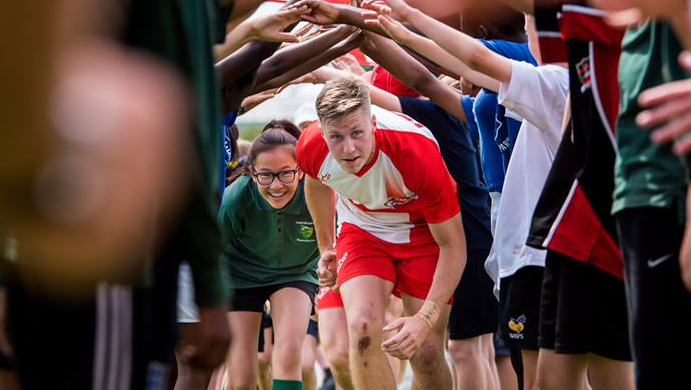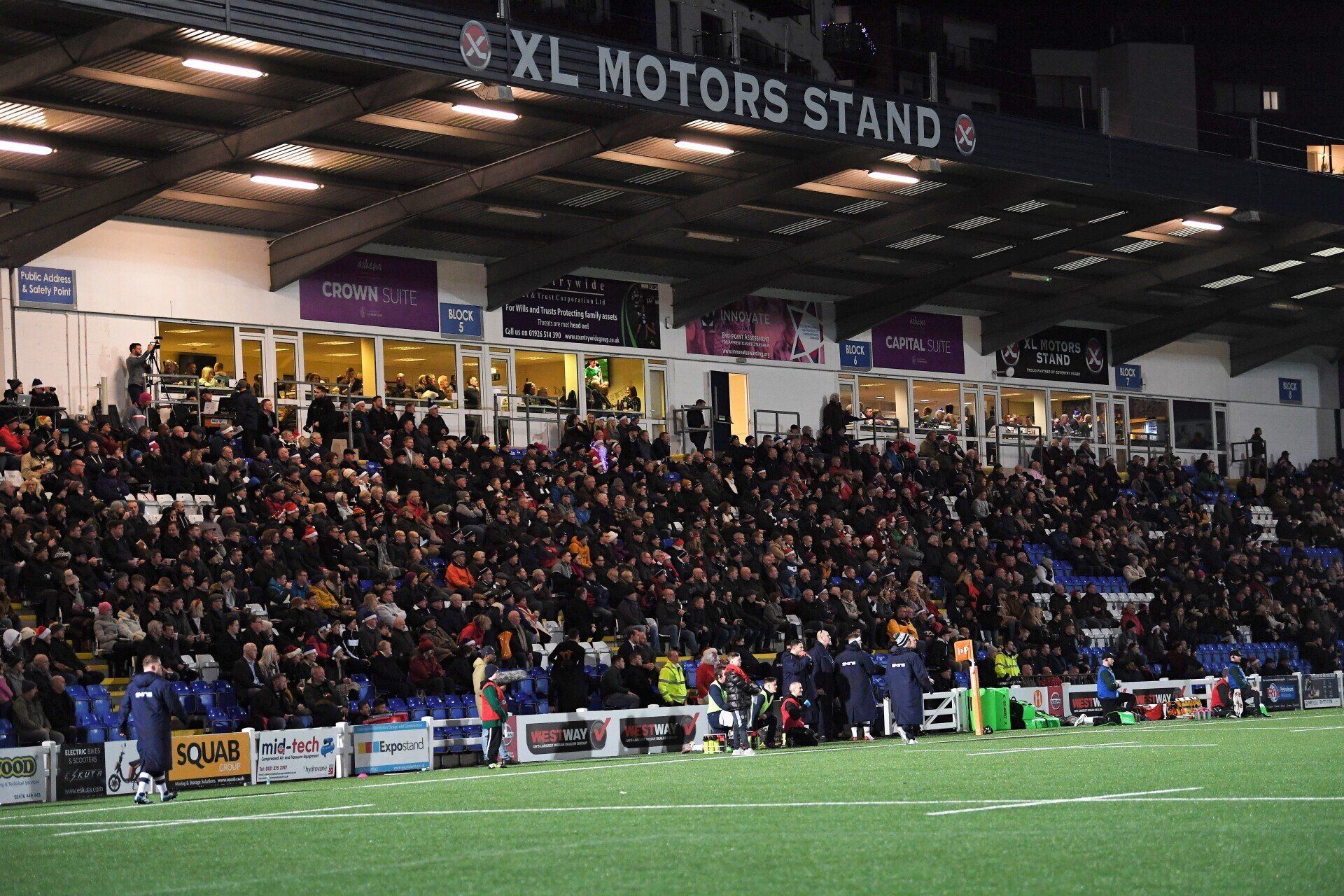CASE STUDY | England Touch
Chris Wearmouth • March 12, 2019
Giving a sport increased and enhanced profile

Background
England Touch has been growing rapidly and in 2018 hosted the European Touch Championships in Nottingham. At the start of the season England Touch had begun live streaming its club tournaments and sought to gain coverage on a wider platform.
The European Touch Championships is a significant international tournament, with 63 teams from 19 countries heading to Nottingham, representing 2,500 players, referees, coaches and supporters.
I had Marketing and PR Manager since Christmas 2016 and took on the additional roles of running the live streaming at the events and then working with facilities partners and BBC Sport to first showcase the sport and then act as executive producer on site to deliver the programming.
Methodology
- At the start of the season I used best practice from other sports, eg the World Rugby Sevens Series, to plan out broadcast schedules, pre-filming featurettes to be used in half-time and match breaks, and arranging co-commentators from the Touch Rugby community (players, coaches, referees, etc) to use their expertise to add colour and explanation to the commentary
- I developed a strong working relationship with 247 Media, England Touch’s facilities partner, using my prior experience of being a main point of contact for the likes of BT Sport, Sky Sports, Telegenic, Arena and Perform introduced broadcast planning sheets, undertaking site recces of clubs to make sure that everything would be in place for a full day of live streaming
- This relationship allowed 247 Media to recommend England Touch to BBC Sport Online as a national governing body worth working with, and following a series of conference calls and meetings they agreed to live stream the European Touch Championships
Outcome
- All four days of the European Touch Championships received coverage, with around 100,000 unique viewers watching from across the world
- BBC Sport Online then agreed to stream the 2018 Nationals (England Touch’s regional tournament), the 2019 Touch World Cup from Malaysia (an agreement which England Touch brokered with the Federation of International Touch), and then the 2019 European Club Championships and Nationals in a multi-tournament agreement
- The additional coverage resulted in greater awareness across broader outlets and more players taking up the sport at clubs across the country
Project reflections
Sometimes the stars align on a project which ticks all the right boxes, and for me this has been it, not just in terms of utilising previous experience and expertise to deliver an outstanding one-off, but turning that into repeat agreements with BBC Sport Online.
At Northampton Saints I was very hands-on with the broadcasters, whether in terms of their facilities requirements and set-up through to the editorial content (interviews, research, etc), so when it came to setting up the live streaming with England Touch I had a head start.
The main thing was to make sure that we would be able to hit the ground running on a tournament day, which would have between eight and nine hours of live broadcasting. With the site recces, assessing the status of internet access to upload the stream, contacts, locations and so on I would compile the relevant broadcast planning sheets and running orders, something which the directors regularly showed their appreciation of.
Over the course of the season the co-commentaries became a regular part of the day for many players, referees and coaches, and when we got to Nottingham there was no shortage of people to choose from. In this I was helped immensely by Ben Powell, then president of the European Federation of Touch, who recommended individuals from Europe who could give an overseas perspective on the sport.
By then we had also invested in the featurettes to bring them up to the standards needed by the BBC, and once the coverage got underway in Nottingham it ran like clockwork, after a small technical glitch.
My attitude was always not on delivering at the European Touch Championships but on whether the BBC would agree to live stream a further tournament. They did this with the finals day of the 2018 Nationals, and then again with the 2019 World Cup from Malaysia. This was followed by two more club/regional tournaments later in 2019, and we now have a very strong relationship with Salford.
The reception from the players and teams was also very positive, both at Nottingham and in Malaysia, and England Touch is now also recognised as a world leader within the sport for the way the profile of Touch has been boosted.

You can never take digital for granted at any size of company Best practice brings unforeseen benefits Digital is now more important than ever to an SME, both to reinforce existing operations and to diversify into new areas The priority has to be making sure that the right foundations are in place As an independent consultant it is equally important to be able to multi-task effectively to support in-house operations For the last 18 months I have been working on a consultancy basis with Coventry Rugby Club, one of the most historic names in English – and indeed world – rugby. I proactively reached out to the club’s management to become involved because Coventry is one of those good news and positive projects which can give you a massive amount of intrinsic reward. Fortunately I thrive on my ability to multi-task and to be involved across a range of areas. Although brought in to look after the media, PR and content, the lockdown has seen me take on more commercial and sponsorship responsibilities, act as a ticket office and retail manager, strategic planning, and go way back to the old school by waiting tables for the first time since 2005! But it is in the digital areas where my experience has paid off the most and I don’t think it is overstating it to say that without plenty of hard work this time last year the club would not have been able to manage the lockdown as effectively as we have. Don’t get me wrong, times have been challenging, but we have been able to use digital across a range of areas to generate cashflow and much needed reserves that can help us build into the new season positively, whenever it starts. When I joined the club it is fair to say that there were a few areas which were still in the old school. Ticket sales, for example, were handled manually, with an 100 percent paper-based booking set-up for Season Tickets, manual ‘tick off’ entry lists at the turnstiles, very few advance ticket sales and a heavy weighting towards match days. Suffice to say the inefficiencies were glaring, as was the reliance on one person in the office to manage it. The process As with the vast majority of the RFU Championship - and indeed lower league sport anywhere - budget has been very limited, and there was even less infrastructure in place. A website, yes, but one which had had no development since being launched, but no e-commerce and no e-ticketing. It was the latter which took priority to increase efficiencies and bring the core business of the club, namely match days, more in line with best practice, both in terms of increasing reach and advance ticket sales but also in helping other areas, beer ordering, for example, to be approached with greater data and understanding. We were understandably limited in terms of the ticketing companies we could work with, whether because of the need for experience in the sporting sector, the lack of budget for investment, and the need to keep the cost for customers and users low. Future Ticketing were the ideal partner who ticked all three boxes, along with many more, such as a web-based dashboard which is as easy to use on a mobile as a desktop, a scanner app which makes the turnstile operators’ life simple, and clear reporting and event set-up processes. My experience had been in customer journey rather than the set-up and implementation of a ticketing system, but through the hard work of Jo in the Coventry offices and Ann Marie at Future Ticketing we had everything up and running in no time. The impact The 2018/19 season had seen a rough split of 25:75 in terms of advance:matchday ticket sales, with a sizeable number of people paying in cash. My aim at the start of the process was to have this ratio reversed by the end of the season, and by the time the lockdown came into effect we were almost there, with a 65:35 split, which also in turn minimised matchday queues at the ticket office and turnstiles and reduced the amount of cash be held on site. Meanwhile the introduction of scannable season cards eliminated in one fell swoop both the long queues while the turnstile operator ticked off names, not to mention saving tens of sheets of paper which had needed to be printed off each week. On the data front the scanning reports has given us the insight into when people come into the stadium, informing our plans for matchdays next season, and the size of the email database went up between 5 and 10 percent each week. There were other additional benefits of going with Future Ticketing. I hadn’t included other events such as rugby camps in the original brief, so it was very pleasing to not just find out that we could have those events set up, but to be able to set them up ourselves with relatively little effort ended up being a superb addition into the club’s commercial mix, again reducing the need for everything to be done manually by someone in the office. The lockdown Putting it simply, had we not gone with Future Ticketing then the lockdown would not have gone as relatively smoothly as it has. Not in terms of season ticket renewals, which would have been done by any ticketing system, but in how the club was able to introduce multi-sport camps and Sunday lunch events, all using the same platform. This increased the efficiency in terms of the number of systems being used but also in the accounting processes, equally important given a reduction in workforce due to furloughs. I’m particularly proud of the way we have set up the Sunday lunches to manage things like staggered arrival times, the pre-ordering of food choices, advance payments, and the collection of names and contact details, getting ahead of the curve in these days of increased requirements from central government. Not bad for a ticketing system brought in on a tight budget! The future This article has focused on one aspect of the digital, but it is important to remember that you need to get your processes right before you put the sheen and gloss on. There is no point in having the shiniest website full of the latest bells and whistles if no one can order anything through it. The work I’ve been able to do with Future Ticketing, and then training and empowering other members of the team at Coventry Rugby, has given the club a solid foundation and the right set of tools from which a stronger future can be built. It is also the embodiment of why I named my communications business New Dogs Old Tricks - the truisms of what you need to make a business successful still apply. Finally, I’ve also been enjoying using my full range of skills and experience, whether in putting the strategy together; building, implementing and developing a system; delivering the actual events (including waiting tables for the first time in 15 years); and then setting out the next steps for the future.


